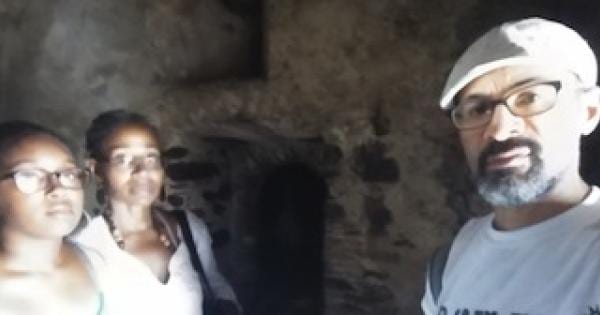Naia, Netta, and Mitty, at the Door of No Return. My daughter said: “Dad, I didn’t quite expect to see so many Mercedes on the road.” “Or cell phones everywhere,” added my girlfriend, “even with the street vendors.” I smiled, and turned from the guidebook to join them gazing out the bus window. True, their first trip to the Motherland was exposing them to a Ghana with more modern trappings than I observed in my prior journey 20 years ago when the country was just beginning its major economic ascent, becoming in 2011 not just Africa’s but the world’s fastest-growing economy. Yet the bus still had to crawl frequently over gnarly road conditions, giving us a clear view of the shacks and barefoot children that filled the landscape on our five hour journey from Accra north to Kumasi. “Dad,” my curious one chimed in again, “it seems like there are two Ghanas.” Let me back up to explain briefly that our 10-day journey was inspired by Ghana’s declaration of the “Year of Return” – the 400th commemoration of the Trans-Atlantic slave trade. It peaked the interest of my 15 year-old Naia and my girlfriend Antoinette (“Netta”); and it stirred in me the desire to reconnect with this country for which I had experienced love at first sight those many years ago. And so we heeded the call, for when Ghanaians – renowned for their warm smiles and sincere spirits – say “Akwaaba” (welcome), who can resist? Perhaps it is this open spirit that also explains the unification of this rapidly growing country, which is smaller than the state of Oregon and has nearly quadrupled in population over the last 50 years to its current 30 million. Ghana stands out not only because of its English-speaking capacity and political stability but its peaceful coexistence of 70-plus ethnic groups and its mix of Christians, Muslims and followers of traditional religion. One of the reasons why I consistently recommend Ghana as a starting point for those visiting the Motherland is its clear sense of a distinct, vibrant identity – the cadence, rhythm and passion of Twi, Ga, Ewe, and Fante; the bold, brightly-colored patterns of the Ashanti kente cloth; people’s elegant, straight-back stride; and the captivating “High-life” music pumping from car stereos and street vendor’s radios. Ghanaians have much to be proud of: their many indigenous cultures and languages which have not perished with English or modernization; their rich Ashanti traditions and continuing lineage of local royalty; and their transition, following 20 years of military coups, to democratic rule and effective multiparty elections with 70-plus percen participation rates (versus the USA’s 55%) and a peaceful transfer of power in 2016 between rival parties. Indeed, it was Ghana’s courage and leadership as Africa’s first country to break the yoke of colonialism that spurred on the succession of 1960s independence movements. Appreciation here extends not only to visionary statesman and prolific author Kwame Nkrumah but also to the mass movements behind him – and the women. We learned how this stems from the fighting spirit of Yaa Asantewaa – the 60 year old Queen Mother who led the Ashanti into battle against the British after they exiled her grandson the king. And, the country’s openness embraced our African American intellectual giants W.E.B. and Shirley DuBois, both of whom renounced their American citizenship and moved to the capital Accra in 1961 where W.E.B. died and is buried, after helping to forge the vision of Pan Africanism to unite the Continent and liberate Black people everywhere. They were followed by many African-Americans who planted the seeds of “return,” choosing to repatriate or consider Ghana their second home, including Maya Angelou and Malcolm X. It was inspiring to see large tour groups of our sisters and brothers continuing this tradition by making this pilgrimage, and learning that some have for years been deepening their ties here, buying property and making investments. “But do they see us?”, asked Mr. Alote, a local analyst and griot-historian whom we befriended at Accra’s Jamestown Café, a new center dedicated to promoting art and intellect, owned by acclaimed architect Joe Osae-Addo and his sister Maanaa, who was our gracious host. As he walked with us through Jamestown’s bustling neighborhoods, Alote raised a skeptical eyebrow about the perspective of those who are returning – seemingly concerned only about the past, while overlooking the plight of the people living today in the shadow of the slave fortresses. Though perhaps unintended, the three of us were forced to see. Undertaking long road trips and utilizing public transportation – including waiting for hours at local markets for the bus to fill – we observed first-hand that it is an extremely hard life for most people. Ghana is widely recognized for having done much to reduce poverty, yet 25% of the population still earn less than $240 a year; begging and homelessness is growing, and housing shortages, pollution and disease are severe in certain areas, with social programs notably underfunded. Conversely, “the number of millionaires will increase by 80% over the next decade and the country’s wealthiest 80 people own the equivalent of 7% of the country’s entire GDP”- as evidenced by the high-end shops we saw at the new malls, and the proliferation of expensive cars on the road. Brother Alote’s observations were worth considering, leaving me wondering about a sometimes overly sentimentalized notion of “return” by us privileged westerners who can afford thousands of dollars for the journey with a myopic focus on the past. I felt compelled to ask “return for what?” Indeed, was that not essentially the cry and demand of the people against their own beloved Kwame Nkrumah: “Independence — for what?” Nkrumah whose statue was toppled when he was overthrown in 1966. As noted by Thomas – our young, bright and impassioned guide at the Nkrumah mausoleum – the severed bronze head remains seated separately, ominously, as a stark reminder of the challenges of power and the potential consequences if leaders do not remain accountable to their people. “We seek more than a change in composition of our oppressors; we seek freedom,” Thomas said proudly. For this reason, the slave castles of Cape Coast and Elmina were particularly poignant for me on this trip. I cried; we cried; the groups of fellow sojourners all cried – for the dark, cramped dungeons, the torture rooms, the water pool above, specially designed to ensure that those attending chapel on top would not have to hear the cries and clang of the shackles below, the “Door of No Return” – all are harrowing reminders of man’s inhumanity to man. But they also remind us of the complicity of local kings and chiefs in the slave trade. Inspired by the Adinkra symbol “Sankofa” – learning from our past -we must never allow new forms of enslavement, whether by multi-national corporations or local businesses, not on ships this time but in sweatshops. Ghana’s great bounty – the precious minerals, oil, gas and a highly diversified economy – offer prosperity for not only a few but for the collective good, which is a common concern of many African traditions. Perhaps a new Diasporic partnership, spawned from the vision of DuBois and the Pan African pioneers, can fuel a new dialogue on building a truly justeconomy based not merely on “growth” but also on a real commitment to distribution and quality of life (health, education, living wage, etc.) for the average person; and hopefully it will address the paradox of persistent poverty within the wealthiest continent, possessing 70% of the world’s mineral resources. A new, productive conversation would move beyond the common refrain of “corruption” to address the fundamental underlying issues of extraction and the undercounting and siphoning off of the Continent’s massive wealth. After all, it was Nkrumah who warned against such insidious patterns of “neocolonialism,” patterns which may explain why all of Ghana’s riches and economic growth are somehow still rated in the “official” global indicators at a value that is one-third below the economy of Cuba, a country considerably smaller by size and population, virtually absent mineral resources and US investment, and operating outside of “free market” principles. Embarking on its own path, Ghana, could become a real-life “Wakanda” – “WaGHANdA”! – leading a Continental and Diasporic commitment to local ownership, control and processing of its own natural resources; to prioritizing local goods over its extensive imports; to cultivating new technologies that are sustainable and life-affirming; and to building a “development” model that is not constrained by “growth” and accumulation in the hands of a few but cares for distribution and quality of life for all. Gathered on our last evening for a talk by scholar Kojo Yankah at the Jamestown Café on the state of the Black Diaspora, a young Ghanaian-Londoner asked how we influence the next generation against the tide of social media and commercialism. I have faith that with its proud traditions, political stabilization, strong economy, increasing commitment to education, and cultural vitality – Ghana – with solidarity and support from the Diaspora and loving allies — will find a way. In fact, it offers the hope for new, distinct and sustained African identity that doesn’t seek to emulate the West. It is perhaps this distinct creative element that can assist the contagious transmission of a new, transcendent vision beyond materialism, consumerism and individualism — focused instead on collective liberation, the realization of full human potential, and planetary survival. In this designated “Year of Return,” a marker was placed on the back of Cape Coast castle – at the very spot where our enslaved ancestors took their final steps before being hauled into that horrific Middle Passage. Above the final portal there is now a new sign: “Door of Return.” As we turn and confront our past, let us not only draw from history but commit to forging a truly transformed future. “WaGHANdA Forever!”
source: blackstarnews.com


 Call Center
Call Center
